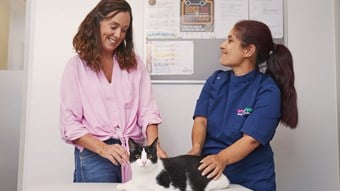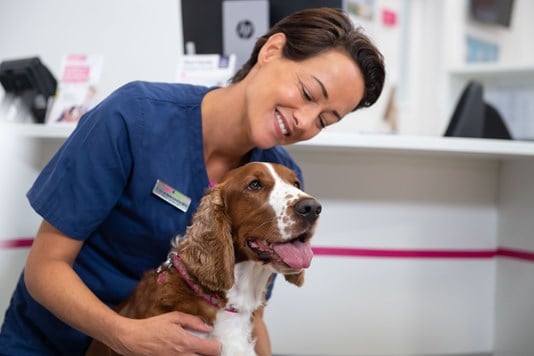Vaccinating Your Pet
All our practices offer routine vaccinations as part of their standard service and recommend cats, dogs and rabbits are protected against these diseases at an annual appointment. A vaccination appointment is much more than just a quick injection. Our vets and nurses will conduct a full health check on your pet to make sure that nothing is amiss, and will also make sure to listen to any of your worries or concerns. Have a think ahead of time too – your vet will ask you questions about how your pet has been, and if you have noticed any changes.
-

Cat & Kitten Vaccinations
A cat vaccination appointment is a chance for your pet to get a physical health check, as well as offer them protection against a range of diseases.
-

How preventative health care can save you money
The simplest way pet owners can give their pets a chance of a long, illness-free life is by keeping them as healthy as possible, and it will save money as well!
From £8 per month
Complete Care

Vaccination FAQ
There is good evidence that the vast majority of dogs are protected against viral distemper, hepatitis and parvovirus for three years after the primary course of vaccinations. Similar data exists for panleukopaenia and feline leukaemia in cats, and for this reason our vets have carefully selected vaccines that allow extended intervals between vaccinations against these diseases.
For other diseases such as leptospirosis in dogs and flu in cats the vaccine protection does not last much beyond 12 months - that is why revaccination against some diseases is recommended on an annual basis.
This means if you look at your vaccination card you’ll see that, while your dog or cat has vaccinations every year, it won’t always be against the same diseases.
Titre testing (blood testing) is available for checking a dog's antibody levels against the core viral diseases at all of our clinics upon request (there is no effective test for leptospirosis). This carries an additional cost above vaccination and involves a blood sample being taken.
An annual visit to the vets also means a chance for a full top to tail health check, giving you and your vet the chance to spot any brewing problems early. Another great reason to get your vaccination appointment booked!
We strongly recommend annual vaccination against leptospirosis. Known as ‘Weils disease’ in people, this disease causes liver and kidney failure in humans and dogs and can kill. While there is always a very small risk of an adverse vaccine reaction this is hugely outweighed by the risk of leptospirosis in dogs. Even dogs which have a very small home range should be protected as the disease is carried by rats, which are found in and around even the tidiest gardens!
The first booster, given at around 15 months of age, is vitally important as it will catch any pet who has failed to respond to their primary vaccination course. Many of the modified live virus vaccines produce a very strong immune response that only needs to be boosted every few years. Other vaccines cannot produce the same level of immunity and require more frequent (often yearly) boosting. This is why your pet may receive a different combination of vaccines from year to year.
Testing antibody levels in the blood is a good way to assess an individual pet’s immunity level against a specific infection, although in dogs this is only reliable for parvovirus, distemper and adenovirus. If antibody levels are found to be high when a booster vaccination is scheduled, then your vet may advise you to delay the administration of the booster. Since this will be outside the licensed use of the vaccine, this deviation from vaccine protocol is termed ‘off-licence’.
Unfortunately it is impossible to fully protect your pet from exposure to diseases. Pets can escape; some diseases can live in soil on boots and be brought into the house; cattery or kennel stays can expose pets to other animals, and wildlife such as rats can enter homes.
While an indoor pet is safer from disease exposure than an outdoor pet there are advantages to outdoor access in terms of welfare and, while house rabbits and cats can do well indoors, all dogs need outdoor exercise as part of their regular routine.
Full vaccination provides protection in all circumstances – safest all round!
The number of diseases for which there are now licensed vaccines in the UK has increased significantly over recent years. Vaccines are considered either ‘core’ or ‘non-core’. Core vaccines protect against serious diseases that are likely to be widespread within a region, whereas non-core vaccines are only given to pets when there is a specific risk of infection.
Your vet will advise you on the risk of non-core diseases and if it would be beneficial for your pet to have them. This includes diseases such as kennel cough for dogs and Chlamydophila for cats.
A combination vaccine is available to protect rabbits against the three most common fatal diseases, myxomatosis, Rabbit Haemorrhagic Disease 1 (RHD1) and Rabbit Haemorrhagic Disease 2 (RHD2).
Myxomatosis is a highly infectious and usually fatal viral disease that causes swelling and inflammation of the mucous membranes and discharge around the eyes. Both RHD1 & RHD2 are extremely contagious with a high mortality rate.
The only alternative to vaccination is to prevent exposure to disease. This means keeping your dog, cat or rabbit isolated from any other pet or animal that could be infected or be a carrier of a disease against which vaccination would normally have been given. Some infections, e.g. parvovirus, can enter the household on inanimate objects such as grooming implements, food materials, clothes, shoes and hands. Other diseases, such as myxomatosis, can be transmitted by biting insects.
While you may, technically, be able to limit your pet's contact with these diseases there may be welfare concerns with the lifestyle that would be required for your pet for this to occur.
Using titre testing to check levels of immunity annually after the initial vaccination course can reduce the need for vaccinations, but some diseases cannot be tested for in this way and so routine vaccination against these diseases is still recommended.
Whether to vaccinate elderly pets or not has more to do with their activity and likely exposure to disease than their age. For example, if your cat never comes into contact with other cats and you are not going to introduce any new cats or kittens into your household, then the benefits of vaccination may be limited.
It must be borne in mind that the immune system of an elderly animal is less robust, so if they are likely to be exposed to infection then continued vaccination is all the more important.
Vaccination has prevented serious diseases and saved the lives of thousands of dogs, cats and rabbits in the UK. However, any veterinary procedure, no matter how commonly it is performed, carries some level of risk. When deciding what is best for your pet it is vital to balance the benefits of vaccination against the risks. For the majority of pets the benefits far outweigh the risks. Your veterinary team can help you understand the benefits and risks, and help you to decide upon the best strategy for your pet as part of an overall preventative healthcare programme.
Vaccination is not a completely risk-free procedure. In the majority of individuals, however, the benefits greatly outweigh the risks. Vaccination reactions are thankfully rare, with adverse events being reported once every 200-250 vaccinations given.
The vast majority of these reactions are mild and short-term, and indicate that the vaccine is effectively stimulating the immune system. Common signs reported are swelling at the injection site, mild fever, tiredness and lack of appetite lasting 24-48 hours.
Given that illnesses can occur at any time, they may sometimes develop shortly after vaccination; this does not mean that the vaccine caused the disease. There have been a number of studies investigating whether diseases in which the immune system malfunctions, such as haemolytic anaemia in dogs, may be more common in the months following vaccination (when the immune system is being stimulated), than at other times. To date these studies have not shown a significant link, but a previous history of immune-mediated disease should be taken into account when deciding on a vaccination schedule for an individual pet.
If you have any concerns about your pet’s wellbeing following vaccination, always contact your veterinary practice.
It is very rare for a vaccination to be associated with a severe side effect. One very rare side effect is the development of an ‘injection-site sarcoma’. These occur in up to 60 cases per million vaccinations.
An injection site sarcoma is a hard lump that develops where your cat has been injected, usually on the scruff of the neck. They are quite commonly reported in the US, but are very rare in the UK. The vaccines most commonly associated with sarcoma development are those protecting against feline leukaemia virus and rabies.
A concept that is widely circulated online is that ‘over-vaccination’ will cause disease, sometimes months or years later. This is termed ‘vaccinosis’. People who promote the concept of vaccinosis suggest over-vaccination is responsible for a wide range of conditions, from lethargy to lameness to kidney disease. However, there have been no published papers that support this theory and this view is not supported by the vast majority of veterinary professionals.
Pets cannot get autism, and there is no proven link between vaccination and autism in humans. Therefore there is no risk of your pet developing autism from vaccination.
It is very easy to become complacent about vaccination when diseases like distemper or feline infectious enteritis are now rare in the UK. If vaccination rates drop below a certain level, however, a disease outbreak can occur with disastrous consequences — for example the measles epidemic in Wales that resulted in the death of a child.
Owners should recognise that vaccination protects against unpleasant and severe diseases that, even with all our advances in veterinary care, can still be fatal.
Importantly some diseases, such as leptospirosis, are not just transmitted pet-to-pet and are picked up in the environment. For these diseases there is less ‘herd immunity’.
